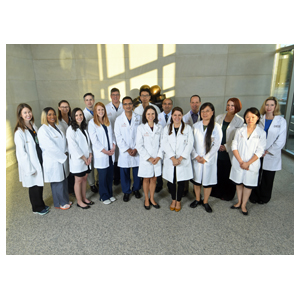Head and Neck Surgical Oncology: How Do We Make the Experience Better for the Patient?
 By asking cancer patients what they want, physicians in the Head and Neck Surgical Oncology Program at Memorial Hermann and UTHealth have designed a truly patient-centered experience.
By asking cancer patients what they want, physicians in the Head and Neck Surgical Oncology Program at Memorial Hermann and UTHealth have designed a truly patient-centered experience.
“Treatment of head and neck cancer requires so many moving parts, and none of us will ever really understand what a patient goes through until we have cancer ourselves,” says Ron Karni, MD, chief of the Division of Head and Neck Surgical Oncology in the Department of Otorhinolaryngology at McGovern Medical School at The University of Texas Health Science Center at Houston (UTHealth). Dr. Karni, who holds joint appointments in otorhinolaryngology and medical oncology, adds, “When I envision the optimal experience for cancer patients, I compare it to a world in which travel is effortless. Air travelers pass through the airport without an ID because everyone knows who they are. They board the plane, and it takes off on time. They land and go on their way. In medicine, we’re capable of that kind of smooth coordination for our cancer patients, and it doesn’t have to be expensive. We do it at UT Physicians and Memorial Hermann-Texas Medical Center by working together as a close-knit team and by always asking our patients what we can do to make their experience better.”
For head and neck cancer patients, physicians have created an integrated package that begins with in-office diagnosis using on-site technology in the UT Physicians Otorhinolaryngology clinic. “Unlike many centers where patients need two appointments for biopsy and diagnosis, we do ultrasound-guided biopsies in the office, which speeds the diagnostic process,” says Kunal Jain, MD, a fellowship-trained head and neck surgeon and an assistant professor in the department. “We have a full-time pathologist in clinic, who can provide a diagnosis and talk face-to-face with patients during their first visit. We use cutting-edge technology, including robotics to decrease the side effects of surgery. Our focus is on patient survival and return to a high quality of life. In cases that involve removal of tumors of the jaw, tongue or skin of the face, our goal is to replace tissue from another part of the body and do it in a way that allows the patient to function as normally as possible. Reconstruction is done by our team, and the patient meets all physicians in the same office.
The traditional model of cancer care at major centers is a multidisciplinary approach that brings specialists together in one shared clinic. “This allows the institution to perform in a way that’s greater than the sum of its parts,” Dr. Karni says. “But we’ve learned from our head and neck cancer patients that they perceive this as an impersonal and mechanized health care experience. As they move through the steps of cancer care, they begin to feel frustrated. For us, this presented an opportunity to do it differently.”
Head and neck cancer patients begin with prehabilitation guided by cancer rehabilitation specialist Carolina Gutiérrez, MD, an assistant professor of physical medicine and rehabilitation at McGovern Medical School, who focuses on preservation and restoration of function, and provides support for cancer or cancer treatment-related impairments. At the Division of Head and Neck Surgical Oncology Survivorship Clinic, Dr. Gutiérrez and other providers coordinate care for patients who have swallowing and speech difficulties, limited neck mobility and peripheral movement, lymphedema and other complications of cancer or treatment.
“We’ve taken key components of the patient trajectory across diagnosis, surgery, radiation, chemotherapy and survivorship and melded them into a patient-centered experience,” Dr. Karni says. “We’ve done this hundreds of times, and each time we ask patients if there are gaps in treatment that we as physicians don’t recognize. We listen, and we change our processes to improve them.”
Dr. Karni, Dr. Jain and Dr. Gutiérrez see patients as early as “I have a lump,” many of whom come from across Texas, Mexico and other parts of the world for a first, second or third opinion. “With our reputation for superior treatment of head and neck cancer, patients with complex problems find us,” Dr. Karni says. “The most intense time for patient and physician is during diagnosis and treatment, but we see them for three to five years, depending on the diagnosis, and many follow up with us for a lifetime. It gives them a sense of solace to know that they’re plugged into the care system. If problems arise with former patients, we see them in two business days if not sooner.”
Schedule an Appointment
Call Us
To schedule an appointment over the phone, give our office a call at (713)-486-5019.
Online Appointment Requests
Patients may submit their appointment requests through our online Appointment Request Form.
Both current and new patients can request appointments through MyUTHealth, our patient portal.